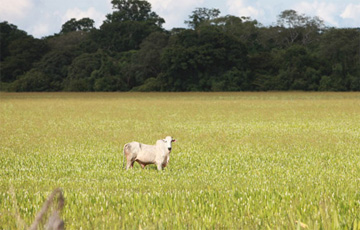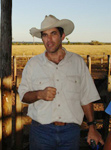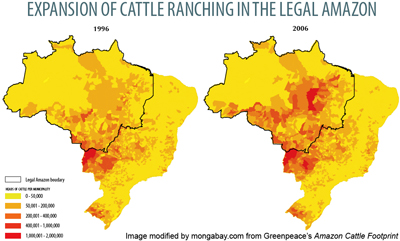The Work Bank’s private lending arm has withdrawn a $90 million loan to Brazilian cattle giant Bertin, following Greenpeace’s release of a report linking Bertin to illegal deforestation of the Amazon rainforest, report environmental groups, Friends of the Earth-Brazil and Greenpeace.
The loan, granted by the International Finance Corporation (IFC) in March 2007, was to expand Bertin’s meat-processing in the Brazilian Amazon. At the time, the IFC promoted the loan as a way to promote environmentally responsible beef production in the Amazon, although environmental groups — including Friends of the Earth-Brazil and Greenpeace — criticized the move.
IFC’s support of Bertin was put in the spotlight two weeks ago when Greenpeace issued its exposé on the Brazilian cattle industry. The report, titled Slaughtering the Amazon [], linked some of the world’s most prominent brands to illegal deforestation in the Amazon for production of cattle products. Earlier this week Brazil’s three largest supermarket chains, Wal-Mart, Carrefour and Pão de Açúcar, said they will suspend contracts with suppliers found to be involved in Amazon deforestation.
William Laurance, a senior scientist with the Smithsonian Tropical Research Institute, said he was pleased the IFC recalled the loan.
“I am delighted to hear that the proposed IFC loan to Bertin, S.A. operation has been halted,” he told mongabay.com. “Cattle ranching—often on illegally deforested lands—has emerged as one of the biggest killers of the Amazon rainforest, and a threat to the region’s indigenous peoples. Bertin has been profiting from this destruction.”
 Mato Grosso. Photo by Rhett A. Butler |
Greenpeace and Friends of the Earth-Brazil also welcomed the IFC’s decision.
“It is good news that the World Bank is withdrawing these funds, yet scandalous that it was feeding a company that causes Amazon deforestation and climate change in the first place. It must now guarantee that it will not invest in such damaging projects in the future,” said Paulo Adario, Greenpeace Brazil’s Amazon campaign director.
“We congratulate IFC for its decision and we hope that this serves as a lesson in the future,” said Roberto Smeraldi, director of Friends of the Earth. “Now, it is important for the National Bank for Social and Economic Development (BNDES) to follow this example. How can a public bank continue as a partner of a company so involved in illegal activities?”
Last year BNDES, Brazil’s giant development bank, loaned Bertin 2.5 billion reais (approximately $1.25 billion).
Cattle ranching is the biggest driver of deforestation in the Brazilian Amazon, accounting for roughly 80 percent of forest clearing. More than 38,600 square miles has been cleared for pasture since 1996, bringing the total area occupied by cattle ranches in the Brazilian Amazon to 214,000 square miles, an area larger than France. The legal Amazon, an region consisting of rainforests and a biologically-rich grassland known as cerrado, is now home to more than 80 million head of cattle, more than 85 percent of the total U.S. herd.
Related articles
Nike, Unilever, Burger King, IKEA may unwittingly contribute to Amazon destruction, says Greenpeace

(06/01/2009) Major international companies are unwittingly driving the deforestation of the Amazon rainforest through their purchases of leather, beef and other products supplied from the Brazil cattle industry, alleges a new report from Greenpeace. The report, Slaughtering the Amazon, is based on a three-year undercover investigation of the Brazilian cattle industry, which accounts for 80 percent of Amazon deforestation and roughly 14 percent of the world’s annual forest loss. Greenpeace found that Brazilian beef companies are important suppliers of raw materials used by leading global brands, including Adidas/Reebok, Nike, Carrefour, Eurostar, Unilever, Johnson & Johnson, Toyota, Honda, Gucci, Louis Vuitton, Prada, IKEA, Kraft, Tesco and Wal-Mart, among others.
Beef consumption fuels rainforest destruction

(02/16/2009) Nearly 80 percent of deforestation in the Brazilian Amazon results from cattle ranching, according to a new report by Greenpeace. The finding confirms what Amazon researchers have long known – that Brazil’s rise to become the world’s largest exporter of beef has come at the expense of Earth’s biggest rainforest. More than 38,600 square miles has been cleared for pasture since 1996, bringing the total area occupied by cattle ranches in the Brazilian Amazon to 214,000 square miles, an area larger than France. The legal Amazon, an region consisting of rainforests and a biologically-rich grassland known as cerrado, is now home to more than 80 million head of cattle. For comparison, the entire U.S. herd was 96 million in 2008.
Can cattle ranchers and soy farmers save the Amazon?

(06/06/2007) John Cain Carter, a Texas rancher who moved to the heart of the Amazon 11 years ago and founded what is perhaps the most innovative organization working in the Amazon, Alianca da Terra, believes the only way to save the Amazon is through the market. Carter says that by giving producers incentives to reduce their impact on the forest, the market can succeed where conservation efforts have failed. What is most remarkable about Alianca’s system is that it has the potential to be applied to any commodity anywhere in the world. That means palm oil in Borneo could be certified just as easily as sugar cane in Brazil or sheep in New Zealand. By addressing the supply chain, tracing agricultural products back to the specific fields where they were produced, the system offers perhaps the best market-based solution to combating deforestation. Combining these approaches with large-scale land conservation and scientific research offers what may be the best hope for saving the Amazon.















